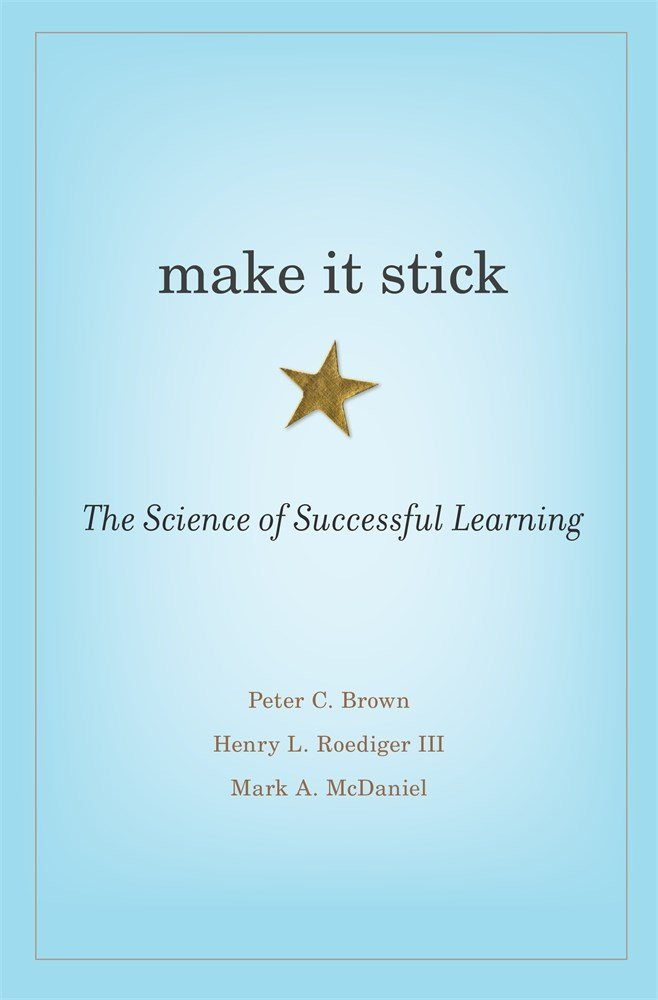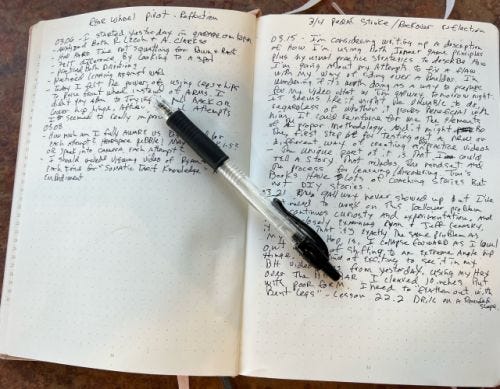There are ways to make reflection interesting and beneficial for developing your mountain biking skills
Peter Brown, Daniel Coyle, and Cal Newport on the benefits of reflection and note-taking as practice tools. And I would add the art of conversation to that short list
“Reflection can involve several cognitive activities that lead to stronger learning: retrieving knowledge and earlier training from memory, connecting these to new experiences and visualizing and mentally rehearsing what you might do differently next time… The learning benefits from the various cognitive activities that are engaged during reflection (retrieval, elaboration, generation) have been well established through empirical studies.” —Peter C Brown
Source: Make It Stick—The Science of Successful Learning
A high percentage of top performers keeps some form of daily performance journal. Tennis champion Serena Williams and former World Series MVP Curt Schilling use notebooks; the rapper Eminem and the choreographer Twyla Tharp use shoeboxes, which they fill with ideas written on scrap paper. What matters is not the precise form. What matters is that you write stuff down and reflect on it. Results from today. Ideas for tomorrow. Goals for next week. A notebook works like a map: It creates clarity. —Daniel Coyle
Source: Tip #4 Buy a Notebook, from The Little Book of Talent—52 Tips for Improving Your Skills
I’m a regular practitioner of reflecting via note-taking in a hand-written journal.
I tell myself: If you don't take time to reflect, you'll waste a lot more time with ineffective practicing.
Plus, oftentimes I don’t know what I think until I start writing. Daniel Coyle was right. The simple discipline of creating a sentence “creates clarity.”
On getting serious about getting better
In his March 15, 2020 blog post titled Mikhail Botvinnik and the Invention of Modern Chess Training, author/blogger/professor Cal Newport highlighted Washington Post reporter Harry Stevens' tweet:
Former world chess champ Mikhail Botvinnik's approach to the game seems like a generally smart way to get good at just about anything
Stevens then included this excerpt from the Wikipedia entry on Botvinnik:
Botvinnik’s example and teaching established the modern approach to preparing for competitive chess: regular but moderate physical exercise; analysing very thoroughly a relatively narrow repertoire of openings; annotating one’s own games, those of past great players and those of competitors; publishing one’s annotations so that others can point out any errors; studying strong opponents to discover their strengths and weaknesses; ruthless objectivity about one’s own strengths and weaknesses.
Newport wrote:
“... this got me wondering how many modern endeavors, especially within the rapidly developing knowledge sector, are still waiting for their own Botvinnik to help figure out how to get serious about getting better.”
I'd add "...and also the sports sector."
The Power of Conversation
Another reflection variation that makes it more fun for me is conversation.
When I’m sessioning obstacles on a trail or skills park with one or two riding buddies, we sometimes talk in-depth about what we’re experiencing—fails especially. I like the culture of curiosity and experimentation that can happen when sessioning. The performance element can add to the excitement and pleasure as long as it doesn’t get out of hand with “Hold my beer. Watch this!”
I sessioned this uphill ladder with my riding buddy Pat Mitzel for an hour, and half of that time involved discussing our technique and tactics after the many failures. (We each cleaned it only once.)
An online discussion can be a way to reflect on your practicing:
I do it regularly with a couple of riding buddies using online chat platforms in which we can privately send each other photos and video clips of our practice sessions.
Online forums can also help reflect in a group setting. I participate in a members-only Facebook group as an RLC Online MTB Coaching coach. The environment is carefully moderated to make it a safe and fun place for the mutual sharing of everyone’s practice struggles.




